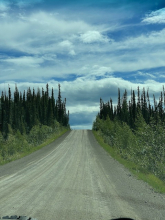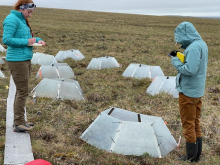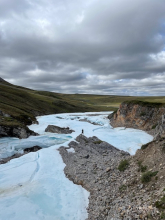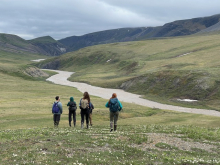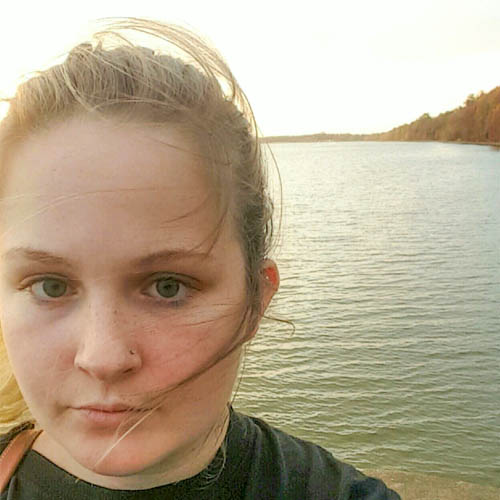Update
In case you missed it, you can watch the archive of Liza's live event from Toolik Field Station here.
What Are They Doing?
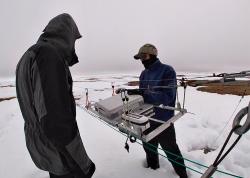 Steve Oberbauer and Jeremy May set up the Mobile Instrumented Sensor Platform (MISP) tram. Utqiaġvik, Alaska. Photo by Alejandra Martinez.
Steve Oberbauer and Jeremy May set up the Mobile Instrumented Sensor Platform (MISP) tram. Utqiaġvik, Alaska. Photo by Alejandra Martinez.
The goal of this expedition is to understand arctic terrestrial change by monitoring vegetation communities in northern Alaska associated with the International Tundra Experiment Arctic Observatory Network (ITEX-AON). The team will study environmental variability and increased temperature on tundra plant phenology, growth, species composition and ecosystem function.
The ITEX network works collaboratively to study changes in tundra plant and ecosystem responses to experimental warming. The network monitoring sites are located across many major ecosystems of the Arctic. This project will provide urgently needed data critical to understanding the impact of multi-scale vegetation change on ecosystem function, namely land-atmosphere carbon and water fluxes and energy balance.
Where Are They?
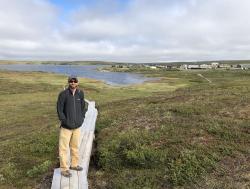 Researcher Jeremy May on the boardwalk at Toolik Field Station, Alaska. Photo by Alejandra Martinez.
Researcher Jeremy May on the boardwalk at Toolik Field Station, Alaska. Photo by Alejandra Martinez.
From Fairbanks, Alaska the team will embark on an eight hour drive to Toolik Field Station, located in the northern foothills of the Brooks Range in northern Alaska. Toolik Field Station is operated by the Institute of Arctic Biology at the University of Alaska Fairbanks and has hosted hundreds of researchers and students every year since 1975.
The team's research sites around the Toolik Lake area are accessed by walking on approximately 1.5 km of boardwalk. They also use a truck for daily visits to Imnavait Creek, North Slope, Alaska.
Latest Journals

Steven Oberbauer is a Professor of Biological Sciences at Florida International University in Miami. Dr. Oberbauer received his B.S. and M.S. degrees from San Diego State University, where he was first introduced to arctic research. He completed his Ph.D. at Duke University studying the ecophysiology of tropical trees in Costa Rica. Dr. Oberbauer currently researches climate change effects in both the Arctic and the Tropics, specifically how plants adjust to changes in their environment and resource availability.

Jeremy May is a visiting postdoctoral research associate in the Department of Biological Sciences at Florida International University in Miami, Florida, USA. He has worked in Arctic Alaska for over 10 years studying the effects of climate change on tundra vegetation. The current project that he works on with Dr. Steve Oberbauer focuses on incorporating traditional, plot-scale vegetation monitoring techniques with landscape-scale, remote sensing technology. In addition to his work in the Arctic, he also studies the impact of hurricanes within the Everglades ecosystem of South Florida.

